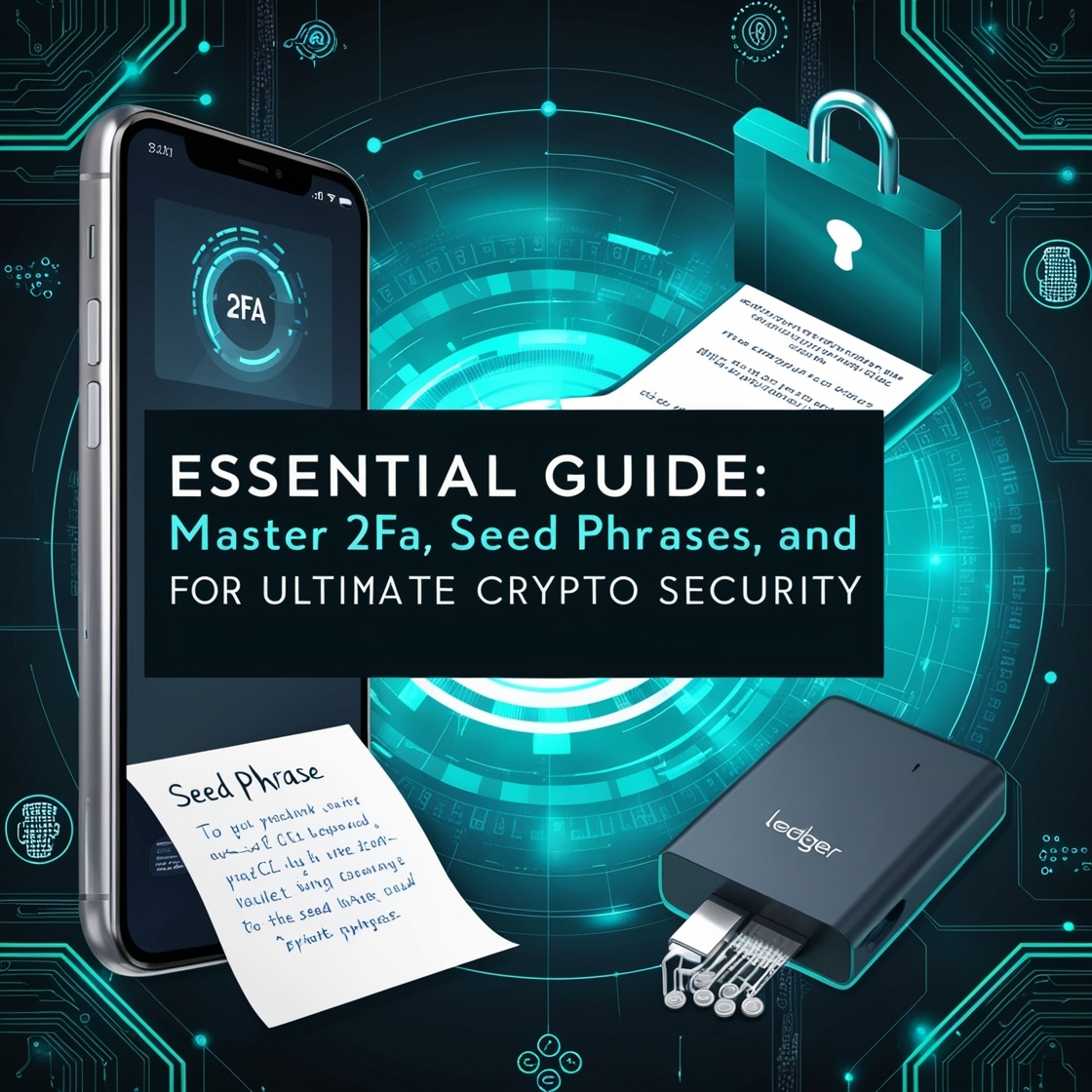Introduction
If you’ve ever wondered how to protect your crypto from hackers and thieves, you’re in the right place. This essential guide will help you master 2FA, seed phrases, and private keys—the three must-know tools that form the foundation of ultimate crypto security.
These tools might sound technical, but don’t worry—we’ll explain everything in super simple language with real-life examples. Let’s jump right in!
Why Crypto Security Is So Important
Imagine this: You’ve just invested your hard-earned money into crypto. But one day, you check your wallet—and it’s empty.
Sadly, this isn’t just a bad dream. Billions of dollars in crypto are lost every year due to hacks and scams. The good news? You can protect yourself by understanding and using three powerful tools:
- 2FA (Two-Factor Authentication)
- Seed Phrases
- Private Keys
These are your digital shields. Let’s understand each one.
What Is 2FA (Two-Factor Authentication)?
2FA adds a second step when logging into your account. It’s like having two locks on your door instead of one.
Types of 2FA
- SMS-based 2FA: You get a code via text message.
- App-based 2FA: You use apps like Google Authenticator.
- Hardware 2FA: Physical keys like YubiKey add the highest level of security.
Real-Life Example of 2FA
Jane used 2FA with her crypto wallet. A hacker got her password but couldn’t get past the code on her Authenticator app. Her crypto stayed safe. Without 2FA, she could have lost everything.
What Are Seed Phrases?
A seed phrase is a group of 12 to 24 words. It’s the key to recover your wallet if you lose access.
How Seed Phrases Work
Your wallet uses your seed phrase to generate your private keys. If you ever lose your phone or laptop, you can rebuild your wallet with this phrase.
Best Practices for Storing Seed Phrases
- Write it down on paper, not your phone.
- Store it in a safe, fireproof box, or even a metal backup plate.
- Never share it with anyone.
Real-Life Example of Seed Phrase Recovery
Tom’s laptop crashed, and his wallet app was gone. But he had his seed phrase written down. Using it, he restored his wallet on a new device and got back all his crypto.
What Are Private Keys?
Your private key is like a secret password that unlocks your crypto wallet. It must stay private.
Private Keys vs. Public Keys
- Public Key: Like your email address—safe to share.
- Private Key: Like your email password—never share it.
How to Secure Your Private Key
Real-Life Example of Private Key Misuse
Sarah stored her private key in Google Drive. Her account got hacked, and the attacker stole all her crypto. A hardware wallet could have prevented this.
How These Three Tools Work Together
Think of them as a team:
- 2FA keeps your accounts safe from login attacks.
- Seed phrases help you recover lost wallets.
- Private keys give you control over your crypto.
Together, they give you bulletproof security.
Extra Tips to increase security
Boost Your Crypto Protection with These Additional Steps:
Use a Password Manager
- A password manager tools to creates and stores strong, unique passwords for every account.
- Never reuse the same password across platforms.
Enable Alerts and Monitoring
- Platforms like Etherscan and Solscan let you monitor wallet activity.
- Enable alerts for login attempts or suspicious withdrawals.
Verify Before You Click
- Always check the website URL before entering your login.
- Bookmark the official websites for wallets and exchanges.
Stay Updated on Threats
- Follow official Twitter handles of wallets and exchanges.
- Join communities on Reddit or Discord to learn about ongoing scams.
Test Your Backup
- Try restoring a wallet using your seed phrase in a safe environment.
- This ensures you’ve stored it correctly.
Common Mistakes to Avoid
Avoid these common errors:
- Reusing passwords or using weak ones.
- Not enabling 2FA on exchanges and wallets.
- Saving seed phrases or private keys online.
- Clicking on phishing links that look real.
Conclusion & Call to Action
Crypto is amazing—but it comes with responsibility.
Take action today:
- Enable 2FA on all your crypto platforms.
- Backup your seed phrases safely.
- Store your private keys offline or in a hardware wallet.
- Use a password manager and set alerts for extra safety.
Want more security tips? Check out our post on How to protect your wallet and stay one step ahead.
Don’t just HODL—protect what you HODL!
Stay safe, stay smart.
